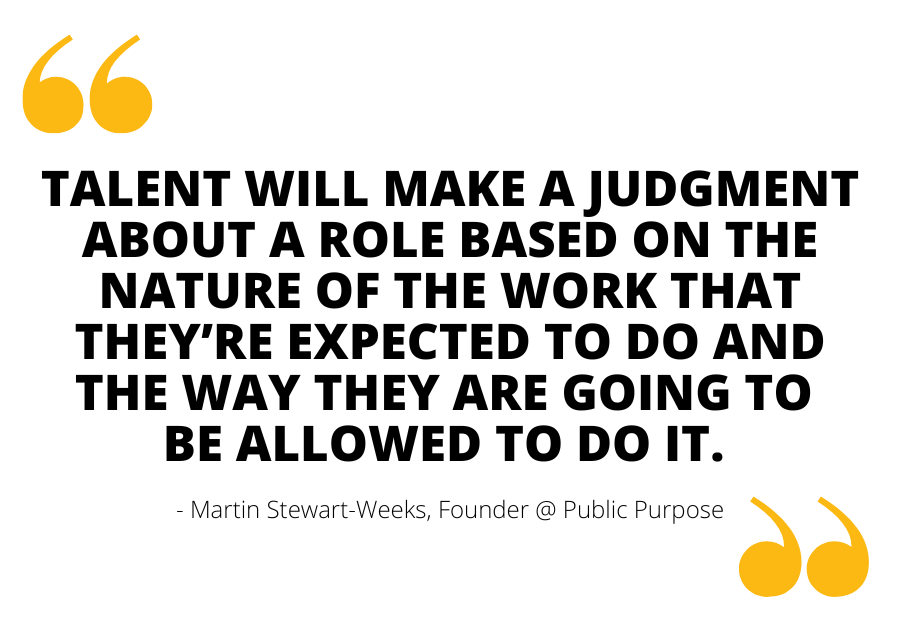One of the key audiences in the process of digital transformation is talent. In this post we explore how this applies to the public sector; how creating a culture of digital participation can attract the people needed to deliver on the difficult, digital challenges at hand.
Everyone is searching for the best talent within a highly competitive market. So, how can an employer stand out from the crowd?
It’s a challenge which applies to so many workplaces across both the public and private sector. If a digitally-savvy prospect can’t see a top down approach to digital participation, it’s unlikely they will view the workplace as an attractive proposition. The research backs this up. By a 4 to 1 ratio, employees prefer to work for a CEO who uses digital and social media (Brunswick Connected Leadership Report 2022).
I recently spoke to one of Australia’s leading authorities working at the intersection of policy and public sector reform, technology and innovation, Martin Stewart-Weeks to seek his opinion on this critical topic. Here’s a snapshot from our chat.
Martin Stewart-Weeks (MSW): Talent attraction is huge. It’s really interesting.
I’m doing some work at the moment with a jurisdiction in Australia around an idea one might call an employee value proposition. In other words, what is it that this particular jurisdiction might want to offer to talent? What expertise would it like to attract into the public service? What would that be?
Now, it’s not the first time this issue has been talked about but it is absolutely critical to talk about again now. We have such an acute talent crisis, frankly, in just about every sector you can think of but I think in the public sector this issue is particularly acute.
We’ve got a situation where the nature of the public problems that we are asking our public servants to grapple with often is very much done in association with a lot of people outside government, and involves partnership and collaboration. And the nature of these public problems has never been more complex, more entangled, twisted and wicked.
So in a way, our desire to be able to get hold of, or get access to the requisite talent is at a premium. Much of that talent is going to make a judgment about whether it’s worth getting into this public service or public work game on the basis of the nature of the work that they’re expected to do and the way they are going to be allowed to do it.
In particular, and not just I think a younger cohort, but certainly for a particular mindset, there is an expectation when you come to work on these complex, wicked, interesting, difficult challenges, that you will be given opportunities to develop those skills of intimacy at scale, digital storytelling, and engagement. It has to be part and parcel.

I speak quite often to people who ring me up to say, ‘I’m just thinking about my next career move. Should I go and work in public service?” And I always say yes, but I also say have a good think about where you’re going, the context at which you’re going, and the kind of leadership environment into which you will be applying. Because you have an increasing opportunity to make some level of demand, if you like, about the nature of that environment in a way which satisfies the way you want to work.
So, long story short, I think the offer from the public sector to requisite talent has got to be an offer that includes the ability to live and work in a digital way. Otherwise, we’re going to find it increasingly difficult to entice and engage, and then to keep and retain the kind of talent we need to tackle the kind of digital problems that we face. And that’s a conundrum. If we don’t break that cycle, you know frankly, we’re all in deep deep trouble.
Roger Christie (RC): A connected, engaged public service, driven from the top down, is a much more effective public service.
MSW: And much more appealing I think.
If I was to say to you, “Roger, what I want you to do is come help me do this sort of public service work and I’m going to expect you to be connected and engaged online.” You’re going to think to yourself, that sounds like a proposition I can handle.
But if you get in there, as I know happens, particularly for relatively young people who go to the public sector and they say, “I got in there and within the first two weeks, I was told I couldn’t say this and I wasn’t allowed to make this comment on that. And I had to stop using Twitter this way or whatever.”
Now, there may be some legitimate reasons. But my point is that so often, I hear stories from people entering the public service who can’t understand why suddenly the ways in which they used to work effectively online are for some reason constrained from every angle. All sorts of prohibitions seem to rain down on them. And they’re left wondering what on earth is going on? It’s not a very attractive proposition.
So yes, I think we both furiously agree that the nature of the offer, the nature of the context into which you are expecting and inviting people to enter and do difficult, difficult work is critical. Change is critical if people are going to make that leap.